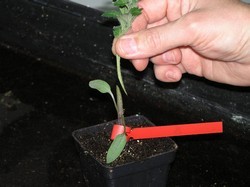How tomatoes deal with stress
Resistance to stressors such as drought, high salt content and nutrient deficiencies is one of the most important features of a modern crop plant. A better understanding of the underlying genetics of such stress resistance will help scientists breed more hardy crops and could promote sustainable agriculture. The project ROOTOPOWER(opens in new window) (Empowering root-targeted strategies to minimize abiotic stress impacts on horticultural crops) was established to better understand the genetics and physiology of tomato breeds with stress-resistant root systems. It also investigated symbiotic interactions with beneficial soil microorganisms such as mycorrhiza (fungi) and rhizobacteria. Researchers tested tomato lines that resulted from the interbreeding of two species (Solanum lycopersicum var. cerasiforme and Solanum pimpinellifolium) for resistance to six different abiotic (non-living) stressors. The results were analysed to find the regions of the genome that control specific traits. Project partners also assessed thousands of plant sap samples for hormone and ion concentrations to better understand the role hormone communication plays in plant stress. The resulting physiological data provided insights into root perception of stress, root interactions with rhizosphere organisms and root-to-shoot communication and its influence on shoot physiology. ROOTOPOWER therefore obtained genetic information and physiological understanding of mechanisms vital for high performing root systems. This increased knowledge of stress resistance in plants will help to develop new breeding strategies resulting crops better able to withstand stressful conditions.







